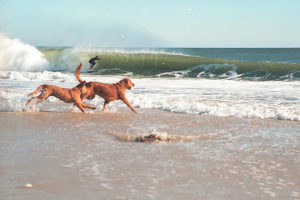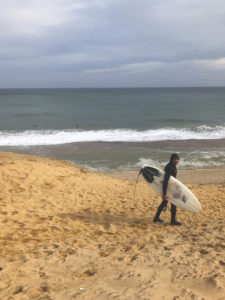Some people, like Shawn Vecchione, are tired of talking about sharks. The constant chatter about great whites caused Vecchione, who owns Vec Surfboards in Orleans, to close the retail side of his business this summer after 10 years.
“It got to a point where everyone wanted to talk about sharks,” Vecchione said. “Mentally I wasn’t here. My heart wasn’t in the retail side of it.”
Vecchione still handcrafts surfboards at his Orleans shop for customers by appointment. He said about 90 percent of the boards he makes are for off-Cape orders.
Even though Vecchione is tired of the discussion, he knows it isn’t going away anytime soon.
He said he’s gotten advice from shark scientist Greg Skomal about public perceptions of the problem but the frenzy around the sharks became too much for him.
He’s not alone.
Olaf Valli, who owns Sickday Surf Shop in Wellfleet, is tired of the media fever surrounding sharks, too.
“The reality of the danger is not nearly as impactful as the coverage of it,” said Valli.
Unlike Vecchione, Valli chose to keep his shop open, but he saw a sharp drop in wetsuit and surfboard sales this past summer. He said business was down by $20,000 in board sales and rentals in July 2019 compared to July 2018.
Valli understands that being a smart business owner means responding to changing circumstances.
“We’re trying to figure out how we can adapt,” he said. “The rentals were big, and those have really dropped significantly. We’re trying to figure out how to bring in new products that are not surfing related.”
Valli chose to suspend his surf school with lessons at ocean beaches in Wellfleet because of concern that no real preventative measures were being taken for the safety of people in the water.

“It feels like Wellfleet or the state just doesn’t care,” he said. “So once we can show that we do care and there are things in place to keep people safe, then people will be more confident to get in the water again.”
Emma Herrick vacations in Orleans during the summer and taught surf lessons with Cape Cod Surf Camp at Nauset Beach for five years before the town shut down the lessons last summer.
During the previous season in 2018, Herrick said, the surf camp was busy even though there were frequent shark sightings.
“We got pulled out of the water at least twice a week,” she said. “Some people thought it was cool and some people got spooked.”
One family even returned for two more lessons after being called out of the water in their first trip.
If the surf school is reinstated at Nauset Beach, Herrick said, she would be willing to teach lessons there again — but only at low tide.
“I don’t think people should stop swimming, but just be more cognizant of what’s going on and understand the risks,” she said.
Both Herrick and Valli worry about the signs installed by towns and the National Seashore that depict a large image of a great white shark.
“[It’s] valid to put the warnings out but they are grossly misrepresenting the danger that’s there,” Valli said. He believes that rip tides and strong currents are more likely to cause harm.
Both Valli and Vecchione said they had noticed a drop in the number of people surfing. More people are turning to stand-up paddle boarding to get a better view of what’s beneath them.
Coverage Is ‘a Joke’
Matt and Jamie Rivers own the Pump House Surf Shop in Orleans. Matt continued to surf regularly this past summer along with a group of diehard surfers who aren’t going to stop.
Like Vecchione and Valli, the Riverses aren’t pleased with media coverage of sharks.
“It’s a joke,” Matt Rivers said of the national media’s portrayal of sharks on Cape Cod.
When a shark sighting is confirmed at a beach, the standard protocol for lifeguards and beach staff is to get everyone out of the water and close swimming for one hour. If a confirmed sighting is not made again within an hour, then people can get back in the water.
But some local and national media outlets post headlines throughout the summer with misleading information, suggesting an entire beach is closed for an indefinite amount of time. That’s not great for the surf shop business.
“We’re still selling a fair amount of surfboards,” Matt Rivers said. But he knows that shark stories will continue to be a threat to his business.
“This is a big learning year,” Jamie Rivers said. She is also a member of the Eastham Select Board. “The towns are doing what we can.”
The highly anticipated Woods Hole Group shark mitigation study was released last month but didn’t provide definitive recommendations for a single strategy to decrease the risk of shark attacks.

Jamie said the towns ultimately don’t have a lot of control because any major changes would have to go through the state and federal governments.
But whatever the towns do should be done in unison.
“We have to provide a unified approach to the state so that it’s consistent and confident,” she said.
Some companies pitched shark deterrent or detection products at community forums last fall and winter. Sickday and Vec Surfboards did carry products from companies like Shark Shield, Sharkbanz, and RPELA at a reduced cost for locals, but the Pump House chose not to sell those products.
“Our customers come to us because of our product knowledge and I don’t feel comfortable handing [those products] out,” Jamie Rivers said.
She said that they don’t discourage others from selling or using the products but she feels like the products are not fully proven and not a guarantee of safety.
Vecchione and Valli agreed that the products are no guarantee of safety but don’t see them doing any harm.
“Whenever there’s big change, there’s big opportunity,” Matt Rivers said. “There’s potential for growth as long as we’re willing to try and find it.”



